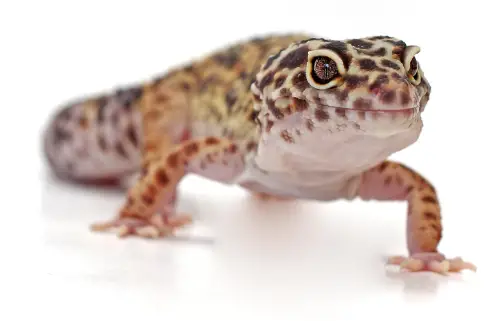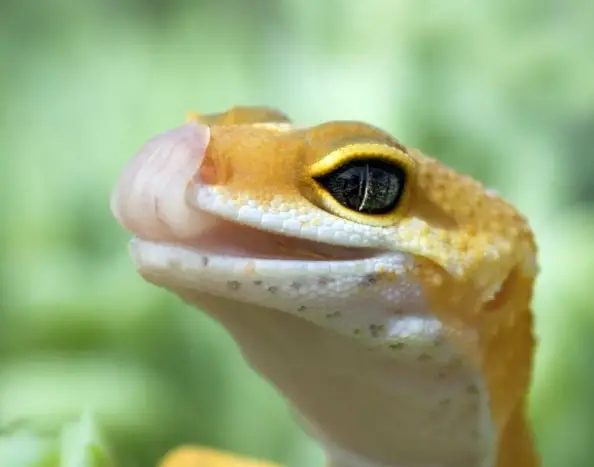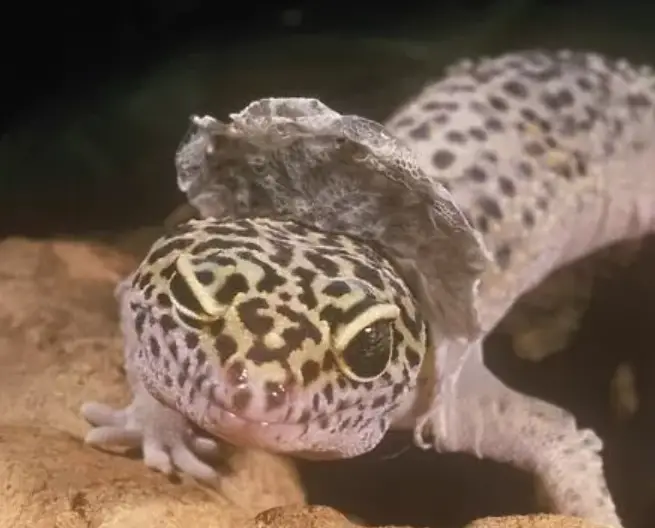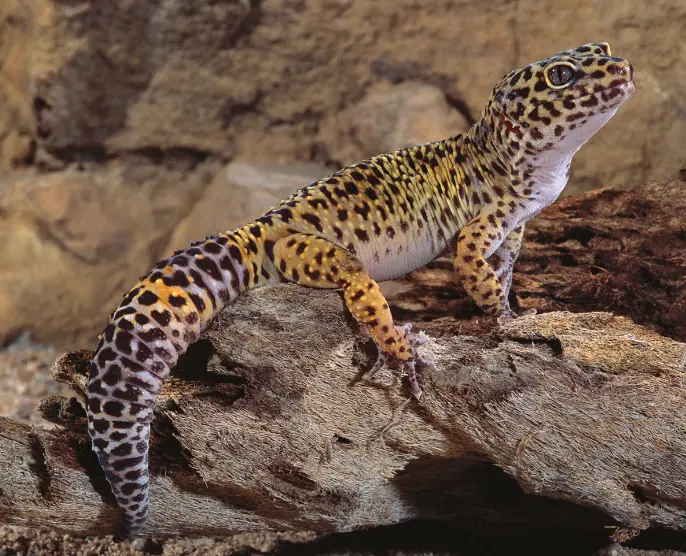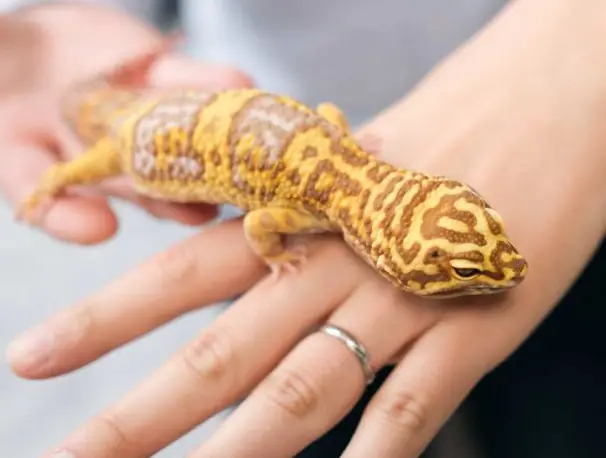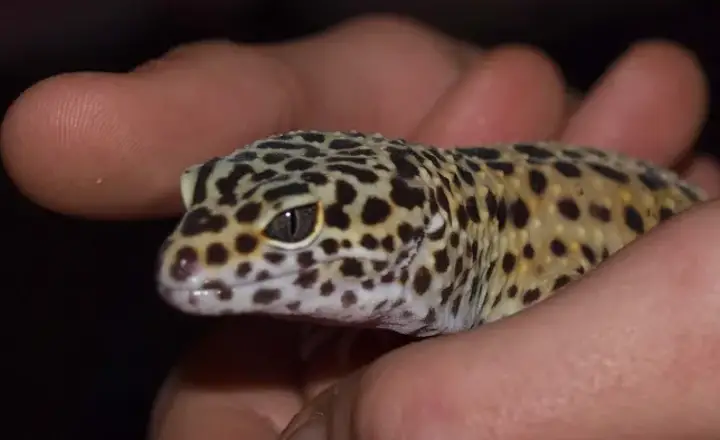My leopard geckos never cease to surprise me, even after all these years. As an illustration, when Ralf, one of my male leopard geckos, began to close one eye for extended periods of time last year, I went on a quest to discover what was wrong with him. Here is the explanation for why your leopard gecko closes one eye.
Only one eye of a leopard gecko closes while the other is inflamed. This might be caused by debris under the eyelid or a scale that became trapped when being shed. Additionally, infection, poor nutrition, and low humidity are other causes. However, there are occasions when keeping one eye open is beneficial, such as while sleeping.
In this blog post, we will explore the reasons why leopard geckos may have one eye closed and what you can do to ensure that your pet is healthy and happy. So, whether you are a seasoned reptile owner or just considering adding a leopard gecko to your family, read on to learn more about this intriguing behavior!
What Are The Reasons For One-Eye Closed In Leopard Geckos?
Here are a few of the most typical issues that could cause your leopard gecko to close one eye.
- Trauma
An eye injury can happen to a leopard gecko even in the safety of your tank. This may manifest as a scrape or bruise on the eye itself or in the vicinity. Leopard geckos can be highly hostile toward one another, especially if at least one of them is a male, so use extra caution if you are housing another one in the same tank.
- Retained Skin
For a leopard gecko, you should make sure your pet has healthy shedding. Leopard geckos have eyelids, unlike many other lizards, hence they shed skin on both the lids and the surrounding area.
If there is some retained or adhered skin close to the eye, your leopard gecko might not be able to open its eye without becoming uncomfortable.
The cornea of the eye might sustain substantial long-term damage if the skin under the eyelid has shed and become stuck there. An expert is needed to fix this.
- Debris
It’s the worst when dust gets trapped in your eyes, I know! Leopard geckos experience it far more frequently than humans because they climb much more and have eyes that are closer to the ground.
It is possible for sand, grit, and even bigger objects to cling to the eyelid. By blinking and secreting fluid around the eye, the leopard gecko usually gets rid of this, but occasionally that doesn’t work. When the eyelid is closed, you might notice any bulges there.
- Dry Eyes
To stay hydrated and free of dirt, leopard geckos exude oil from their eyes. The eyes of your leopard gecko may dry out and stick together if they are not receiving enough water or if the humidity level in their tank is off. Additionally, mucus from sickness can prevent your pet from secreting the fluids it requires.
- Infection
Three different kinds of eye infections are possible in leopard geckos. Which are:
- Viral
- Fungal
- Bacterial
All three of them have the potential to enter the eye, particularly if the cornea or pupil are damaged. Significant harm may arise from this, even changing the size of the eyeball due to swelling or mass shrinking.
- Vitamin A Deficiency
Vitamin A insufficiency, also known as hypovitaminosis A, has been connected to a number of ocular issues in leopard geckos. This frequently manifests as having many similarities to conjunctivitis.
- Abscess
Leopard geckos’ unique eye closure is frequently brought on by the development of a subcutaneous abscess. Usually seen beneath the eye, this appears as a tiny lump under the skin. Infections or trauma are the usual causes of abscesses.
- Parasites
When kept in captivity, leopard geckos rarely develop eye parasites. They frequently live in solitude from bigger populations, which explains this. However, it does occasionally happen.
- Congenital Issues
Unfortunately, due to anomalies caused by defective genes, certain eye closure problems are congenital. These are typically noticeable at a young age in the development of your pet.
- Neoplasia
Neoplasia is a type of lesion or tumor brought on by unchecked cell proliferation. This has the potential to be malignant or benign. Any strange lumps would need to be biopsied in order to determine this. These are almost always just abscesses.
- Light
If you don’t provide your leopard gecko with the right lighting setup, your pet could experience ocular issues, including one eye closing. Your leopard gecko will become extremely unwell if there is too much light and no place to hide or find cover.
- Sleeping Leopard Gecko Closing One Eye
A leopard gecko may occasionally keep one eye open when it is sleeping.
Even while resting, these incredible animals have evolved to evade predators. They are still capable of opening an eye if they hear or feel something nearby because part of their brain is still functioning.
What Are Common Eye Problems In Leopard Geckos?
Large, round eyes with a black slit distinguish Leopard Geckos as cute. However, they are susceptible to eye infections, particularly in environments that are too humid for them. You should be able to identify these eye issues that they are prone to as their fellow person.
- Foreign objects in their eyes
There are no eyelids on leopard geckos. They are unable to close their eyes like individuals do before going to bed. They are also more vulnerable to eye infections and foreign items getting into their eyes, which can clog their tear ducts.
- Watery eyes
Leopard geckos frequently exude a transparent fluid that aids in shielding the eyes from dust and other flying debris. When this fluid is present in excess, they may start to experience watery eyes.
- Eye twitching
Leopard geckos’ eye twitching is comparable to human nosebleeds. When they are anxious and agitated or when their surroundings are very humid. Their eyes are extremely susceptible to inflammation. Luckily for leopard geckos, twitching eyes do not mean that your gecko has an eye problem but instead means that they’re feeling stressed or irritated
- Swollen eyelids
Leopard geckos occasionally get enlarged eyelids around the time they reach sexual maturity, which makes them squint and partially close their eyes. This will quickly go on its own.
- Partial blindness
Partial blindness results from the amount of light entering the eye being reduced, which can happen when the eye is damaged in any way that stops it from opening entirely or from gazing properly. Leopard geckos do not typically have this condition, but it is conceivable for them to.
How To Stop Eye Problems In Leopard Geckos
- Provide proper lighting: Leopard geckos require a heat source, such as a heat lamp or ceramic heater, as well as a UVB light to maintain their health. Make sure the heat and UVB sources are not too close to the gecko, as this can cause eye problems.
- Keep the enclosure clean: A dirty enclosure can lead to eye infections, so it’s important to clean the enclosure regularly and remove any feces or uneaten food.
- Check for mites or other parasites: Mites and other parasites can cause irritation and inflammation in the eyes, so it’s important to check for these regularly and treat if necessary.
- Provide proper nutrition: Leopard geckos require a balanced diet to maintain their health. A diet lacking in certain nutrients can lead to eye problems.
- Visit a veterinarian: If your leopard gecko is experiencing eye problems, it’s important to visit a veterinarian to diagnose and treat the issue.
- Keep the enclosure humidity low: High humidity levels in the enclosure can cause eye problems. Ensure the enclosure humidity is between 20-30%
- Provide a hiding spot: A hiding spot or shelter is an important feature of the enclosure. Leopard geckos feel secure and can avoid stress, which can lead to eye problems.
- Avoid handling geckos when they are shedding: Geckos shed their skin when they grow, during this period they can be sensitive and prone to eye problems so handling them is not recommended.
Conclusion
In conclusion, a leopard gecko having one eye closed can be a sign of a variety of reasons. It could be a symptom of an underlying health issue, such as an eye infection or injury. It could also be a sign of stress or fear, as leopard geckos will close one eye as a defense mechanism. It is important to observe your leopard gecko closely and consult with a veterinarian if you suspect any health concerns. Regular check-ups and appropriate care can help ensure the overall health and well-being of your leopard gecko.
